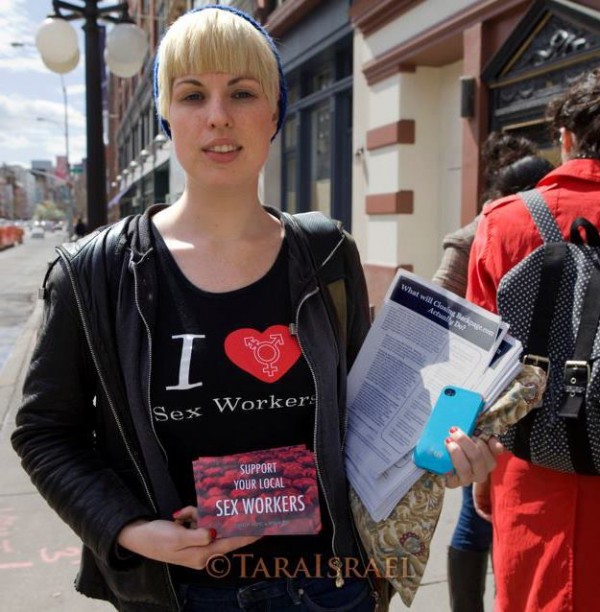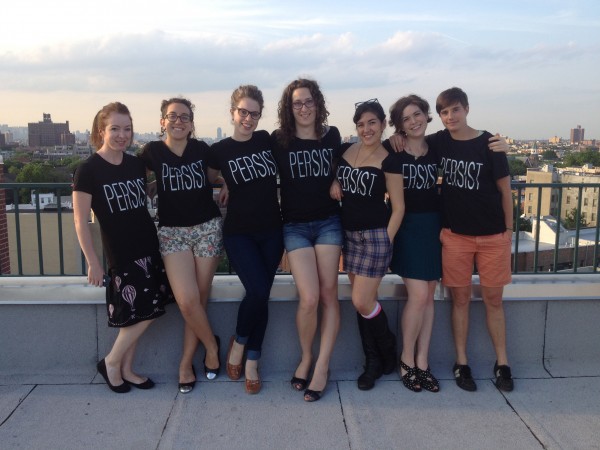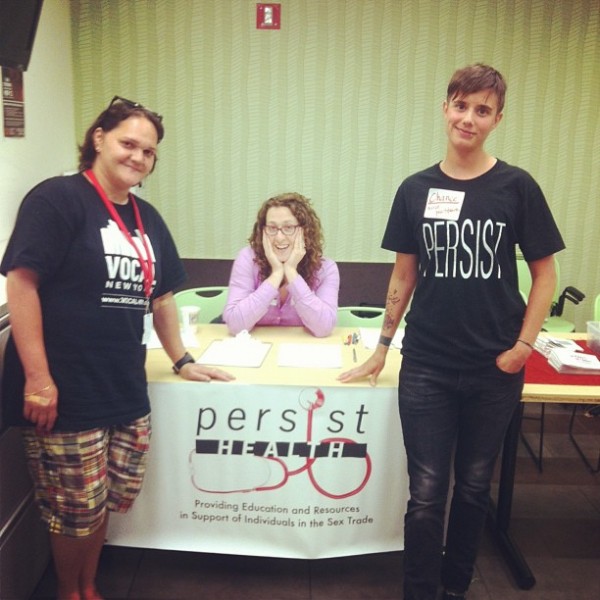
In January 2012, Sarah Elspeth Patterson and a group of other sex worker activists in NYC went to work offering health care and social services to sex workers. The much needed outcome, Persist Health Project, is the 2nd sex worker only health clinic in the United States, after Saint James Infirmary in San Francisco.
While there is limited funding for it as of yet, the Persist team are diligently working on their labor of love and helping to put an end to the lack of non-biased services for sex workers. Sex workers have a history of being subjected to discrimination, stigma, and forced hospitalization and testing in the mainstream healthcare system. NYC’s Persist strives to be a safe space where sex workers can be open and receive the care they need. You can help contribute to the growth of Persist by donating here. Every little bit helps!
I got a chance to speak with Sarah about the project upon her return from this year’s Desiree Alliance conference.
How would you describe Persist and it’s work?
Persist Health Project (Persist) is a peer-led organization that connects folks in the sex trade in New York City with providers who are either from the community themselves or awesome allies. In addition to coordinating care for people —people can call us and have a provider hand-picked for them, based on their needs —we also offer workshops on health topics, such as burnout, sexual health, and general health. To keep enhancing our network of providers, we offer trainings for health care professionals on how to work with folks in the sex trade better.
Persist was co-founded in January of 2012 by a group of sex worker activists, nurse practitioners, and social workers who are also current workers, former workers, or very committed allies. I brought together people I knew were valuable members of sex worker organizing groups, who were either interested in health for sex workers because of their own experiences with sex work or had transitioned from sex work to health or social services. Many of us had been doing organizing together, were friends or peers, and saw a collective need. Others had dreamed for a long time of opening a clinic space just for sex workers.
What was your motivation for working on this project?
I didn’t give my health a lot of thought until I became a healthcare professional and was expected to be an “expert” on these things. After I got my degree, I found myself doing sexual health education and thinking, what about my own personal health decisions? Am I really being “safe” all the time, or do I do things that are “risky?” Are there better ways to think about this, outside of thinking about everything —drugs, alcohol, smoking, sex, food, so on—as a “risk”? What’s realistic for my life, rather than what is generally taught as the “best” thing to do? Of course, the concept of making health choices that fit your life is one the fundamentals of harm reduction. But it was only after getting the “right” answers from education that I wondered about the value of what I already knew from my own life experience, and how that might be useful to others.
I think it’s incredibly valuable to be offering positive, affirming peer support to one another from within communities involved with or impacted by the sex trade. In addition to creating communities and shared life experiences, trading sexual services can also be very competitive, anxiety-inducing and isolating. So part of Persist’s goal is to break the feeling of isolation in health care by shifting ideas of what support can look like.
Why does the sex worker community need this resource?
We all have reasons we avoid going to the doctor. For sex worker communities specifically, going into healthcare and social service settings can be particularly daunting. Sex workers may have no idea what they are going to get from a provider. Will the provider understand where they’re coming from? Will they be cool with sex work, or will they saying something really upsetting or hurtful? When a sex worker is sick, or needs a vital medication, they may not go to the doctor because they want to avoid judgment. This avoidance can range from ignoring a bad cold to putting off serious, long-term health issues. This can have a profound impact on the quality of life that sex workers have. Going to a community-based project to get care can take that fear or concern off the table as a reason not to go.
It’s also important to distinguish, I think, between discrimination as a barrier to care, and lack of access. For sex workers with privilege, many have had some reasonable access to care, it just hasn’t been very good care or it isn’t the kind that treats people in the sex trade as though they are deserving of sufficient care. For myself, my experiences have been less about being underserved, so much as poorly served. So in terms of getting people care that is both affordable as well as affirming of their experiences, it’s our goal to address both needs.
I think there are many amazing support service organizations in New York City that serve people in the sex trade. There are LGBT youth services, youth-led programs, harm reduction sites, and awesome health care providers siloed at larger institutions doing great work. But if you don’t have someone from within the community telling you about this great non-profit they saw or where they get their sliding scale mental health services, you spend a lot of your time and resources stressing out about how you’re going to get through things. At its heart, Persist is a community referral service. We coordinate your health care and offer in-house nurse practitioners. We want to have the conversations with you that others feel uncertain about, won’t have, or worse, will judge you for.
We also run a private group on Facebook for health and wellness referrals, if folks would rather source the community for health-related needs. You can send a private message to me or another Persist organizers on Facebook to be added.
Unlike other organizations out there, one of your goals is not to pressure current or potential participants to stop doing sex work. It says on your web page that the Persist team is made up mostly of people who have their own experience (past or current) in the sex industry. I think that’s great. Why was that an important qualification for staff members?
Persist is about folks in the sex trade defining health for themselves, whatever that looks like. And everyone (including those within our org) has their own definition of what health is. Everyone deals with a different reality, in terms of what their chosen/given families, their relationships, their mental health, their physical mobility, and their access to resources look like. Our realities go into our construction of our lives, but also how we treat our bodies, how we face our problems and how we deal with others on a daily basis. Everyone currently or formerly in the sex trade also deals with some level of stigma in their lives, which definitely affects our health and well being, but some also deal with other intersecting stigmas, like racism and/or transphobia.
So when I consult someone who comes to see us, I don’t even think about it as encouraging or discouraging someone to be in the sex trade. I think of it as, what do you need to feel your best right now? What’s the most pressing issue in your life that we can deal with?That being said, I think there’s a dearth of resources for folks who are interested in exiting the industry, and so that’s one of the reasons why having a peer-led organization was important to us. I think being a peer leader and demonstrating the skills that someone can take from sex work into another career is worthwhile. I also think it’s worthwhile to identify as a sex worker and demonstrate the value of giving back to your community in this way.
What has your experience reaching out to the sex worker community been like so far?

When we hosted our first fundraiser last year (which we will do again this year), we were overwhelmed by the generosity of our communities and the overwhelmingly positive response. We’ve gotten amazing feedback ever since then.
We based our model for Persist on Saint James Infirmary, the first occupational health clinic for sex workers in the United States. One of the differences between our model and SJI is that our providers —Zil, Chance and Lola—are accessible. People can meet them and interact with them. We run a private Facebook group where people can find out about our services and talk to Zil, Chance and Lola. And the providers get wonderful responses, which is what’s most exciting to me.
The Persist team went to the Desiree Alliance Conference this summer. How was that?
The goal of going to Desiree was to introduce ourselves to the larger sex worker organizing community, conduct our workshops on general health, sexual health and burnout, as well as take a brief staff retreat. Our providers also provided informal health consultations and our peer staff provided some peer support for conference attendees. So it was a way to support those at Desiree around their health, as well as get larger conversations going about what it means to deal with whorephobia and other oppressions faced by those at the conference.
What have been some of the challenges around funding, and what can we do to help your efforts?
Funding is, I think, always a challenge for sex worker-led organizations. Because of stigma, and funding limitations, but also the fact that we’re all learning how to write grants, perfect our boardroom drag, and otherwise manage a nonprofit. We may be community organizers who work in nonprofits and health clinics, but it’s a bit of a capacity building jump for us to start our own space. So I think very quickly into the process we realized that this process of building a clinic would have many steps to it, and those steps would be gradual, as we build a budget and get more of the resources that we need.
It’s funny, I’ve had a few people this past month from outside the community tell me how great it was that I was working for Persist, not knowing that I co-founded Persist, am now the Executive Director, and that we’re a volunteer-run organization. It was exciting to me that our professionalism came across so strongly to folks, but also a bit concerning, because I don’t want folks to feel as though we’re not in need of support (because we definitely are). This project is a labor of love, with many, many hours taken out of the workday for that lovin’. It’s no easy task, to be sure.

You guys ran some focus groups recently. Can you share a little about your findings?
In the spring of 2013, Persist conducted five focus groups with diverse community members, including folks of color, transgender and cisgender folks, people living with HIV/AIDS, older folks, age 45 and above, as well as youth, age 18 to 25. We spoke with folks who identified as sex workers, as well as folks who traded sex for drugs/resources and didn’t identify any particular way. There were three major themes that came out of the focus groups.
The first theme was disclosure: being able to trust other people with information about their involvement in the sex trade. People had been outed in the past, by both loved ones and providers, and they felt unsafe. They were uncertain about where their information was going when they got STI tests, especially at a city clinic. Few people had ever disclosed about the sex trade to a provider; they also held back about things related to their HIV status, sexual orientation, and sexual behaviors.
Secondly, there was a need for emotional and social support. Many participants spoke of wanting to have a health care provider they could be honest with and feel as though they trustedeven better if it was someone from the community, who knew the language they used and understood something about their lives. People validated our care coordination efforts, saying how important it was to have someone from the community providing peer support and navigating complicated health care systems.
Thirdly, in terms of an ask for a future space, people asked for a comforting environment and staff. Many participants spoke of feeling alienated by clinical spaces and clinical atmospheres. Many folks wanted a space that felt community-oriented, with resources that fit their lives. Participants expressed a desire to have a space that felt soothing, rather than alienating, with a focus on serving people in the sex trade without outing anyone who wanted privacy and confidentiality.
We are super excited to release the report this fall and provide community-based research on sex worker health, which is such an under researched area.
What are the long term goals for Persist? Where would you guys like to see yourselves a few years from now?
At this moment in sex worker organizing, these monumental events are happening: the Young Women’s Empowerment Project has dissolved and the Lusty Lady has closed. There is such importance in collaborating within our communities and beyond, in order to survive and thrive. That seems most vital in the long term for us. We are a grassroots project, centered our work on providing health and wellness options for everyone in the sex trade, but we regard health very broadly— it’s about the whole person. Our central goal allows us to collaborate with a variety of people working more broadly in health for folks in the sex trade, including healers, energy workers, artists, social workers, those providing services for trafficking survivors, those doing work to heal trauma, anti-violence organizers, and other community-led project workers.
My long term hope is that by us expanding this conversation about health in the sex trade in New York City, who Persist is and what Persist does will also change based on who is involved. I am also excited at the possibility of other folks coming in to the project and creating something of their own. I want them to use what we are starting now as a jumping off point, based on the needs people see. At its heart, this is a community project that should reflect the community’s diverse goals and desires for health and wellness. And I am excited to see how that looks in the future.
This interview is inspiring; thanks! I’m dying to get involved in something like this.
You’re amazing, Sarah!!
Love this kind of work people that care share …